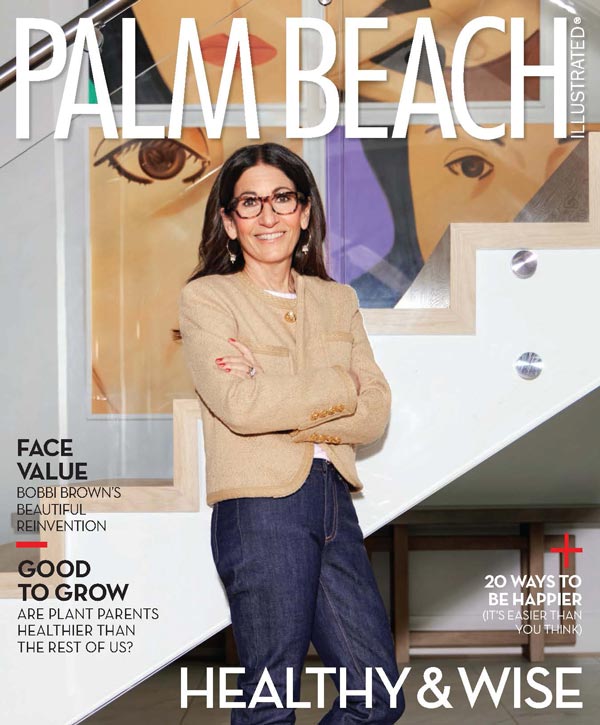
Foodies, rejoice! After sitting out 2020 due to the pandemic, the Palm Beach Food & Wine Festival returns December 9-12. As in years past, the festival will include both intimate gatherings and lively events featuring notable chefs from across the country. New for 2021 is PBFWF at Rosemary Square December 12, a daylong celebration complete with cooking demos, a Battle of the Bartenders, and the Grand Chef Throwdown.
Among the chef roster is Sarah Grueneberg, chef/owner of Monteverde Restaurant & Pastificio in Chicago, who will take part in Indulge at the Four Seasons December 11. PBI recently caught up with the Top Chef season nine finalist and James Beard Award winner to discuss festival cooking, culinary inspiration, and more.
PBI: Do you typically create new dishes for festivals, or do you prefer to showcase some of your greatest hits?
Grueneberg: We do a little bit of both when approaching a dish or menu for an event. Taking part in a festival is a great way to test a fun idea, but I do not recommend presenting a dish that you have not tested out before. Often the confines of the event dictate what’s reasonable to execute off-site. That’s what’s nice about doing a guest chef dinner at a restaurant—you know what equipment you have to work with. I love to present a dish and have people fall in love with it in a new environment.

What can diners expect from you at the Indulge event?
Guests can expect a dish that’s indicative of the Monteverde menu but incorporating local, fresh ingredients. We want to showcase a new and exciting dish that tells a story via the quality of ingredients.
Why Italian food? Why is it such a constant for you?
I got bit with the Italian bug, and I can’t think of cooking anything different. I love the ingredients, traditions, simplicity of Italian cooking. I love how soulful it is, too. I cook from an emotional place, and with Italian cuisine, you can make something that touches you. It feeds more than your palate; it feeds your heart and soul. Italian food has the ability to be something special and humble at the same time.
What’s an example of something you ate in your youth that you reinvented as a chef?
A baked potato was a weekly dinner growing up, and we use it as inspiration for pasta filling at Monteverde for our Zlikrofi with potatoes, onion, butter, crème fraîche, goat cheese, Montasio cheese, and chives. Growing up in Texas, a baked potato with burnt ends might be the best dish on the menu at a barbecue restaurant. And I have a fun broccoli-stuffed potato in my new cookbook, too.

What’s your favorite ingredient to work with and what do you love about it?
I can’t live without lemon and EVOO. You can cook anything with these two kitchen workhorses and it’s perfect—fish, seafood, meat, veggies, bread, you name it. Parmigiano–Reggiano, too, adds umami, richness, and an amazing flavor.
Where do you most often find inspiration when creating a new dish?
Ingredients are the No. 1 inspiration and the center of the dish. I start with an ingredient in season, a new cheese, or something I am craving and go from there.
What’s one culinary lesson you took away from your time on Top Chef?
Lindsay Autry taught me to hand-grate tomatoes. Lindsay made a hand-grated tomato, rice, and crispy garlic dish that blew my mind. At Monteverde, we were hand-grating tomatoes for sauce for the first two years, but it was so labor intensive we had to amend the process. Peels make the difference; cook them with garlic and EVVO and then add to the grated tomatoes. At home, I still hand-grate tomatoes. And to this day, grilled bread with hand-grated tomato is the best snack.
As for what I learned specific to the competition on the show? Never underestimate the time it takes to plate a dish! If you’re not plating when there’s three minutes left on the clock, you’re done.

What would be your ideal last meal?
My last meal would be my family’s fried seafood feast that we’d make after a day of fishing. We dredge speckled trout filets in cornmeal and fry them up alongside hush puppies and oysters. This meal means a lot because of the people I associate the meal with and the memories of learning how to fish, clean it, and cook it with my family—well before I wanted to be a chef. I learned the responsibility of catching, killing, cleaning the food I was eating. Looking back, I really grew from it and the whole circle-of-life lessons. At Monteverde, it’d be the burrata and ham. It’s simple, satisfying, and perfect.
Amid a pandemic and the havoc it has caused in the restaurant industry, how can food festivals help to support restaurants and restaurateurs?
One of the most important things that a festival can do to help support the industry is to ensure that cost and compensation are considered for a team to participate. Participating in festivals provides a great opportunity to network with peers and get inspired, engage existing guests, and meet new customers. Taking part in festivals presents a great opportunity to share the mic and showcase our rising star staff, as well. And it’s crucial when a festival offsets the cost of labor and ingredients to help make it possible to leave the restaurant and be a part of the events. Palm Beach Food & Wine does a great job balancing programming and events so there are opportunities to engage with guests at intimate dinners, take part in curated panels, and get inspired attending thoughtful events all weekend.

As a chef and restaurateur, what has been your biggest takeaway from the pandemic?
My biggest takeaway has been balance and to figure out how to be a better business owner, a better mentor, better partner, and build a stronger support team and inward-facing business. We continually asked ourselves: How do we take care of the team, help them, and pivot? The last 19-plus months have also taught us to not take anything for granted and cherish the moments you have and foster more human relationships. I’ve always been empathetic—it’s how I was raised—but this business can easily block that. We listened to our team and incorporated their feedback in our decisions. For example, when we decided to open for four days, we asked our team whether they preferred four 10-hour shifts or five eight-hour shifts, and we remained open and flexible to what was best for the health of the team.










Facebook Comments